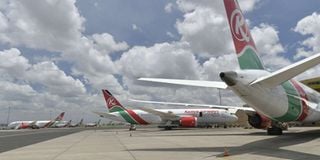Kenya third worst hit as Africa loses 3.1 million aviation jobs

Kenya Airways aircraft grounded at the Jomo Kenyatta International Airport in Nairobi on April 3, 2020.
Kenya is the third worst hit country on the continent in the air travel business by the Covid-19 pandemic.
This is after South Africa and Nigeria, which rank first and second respectively.
A new report by the African Airlines Associations (and the Economic Commission for Africa (ECA) shows that Kenya has so far lost Sh73.2 billion against Nigeria's Sh99.4 billion and South Africa's Sh302 billion.
The report notes that many African airlines risk closing down due to liquidity crisis caused by the Covid-19 pandemic which worsened their indebtedness to banks, aircraft lessors and manufacturers, and which has left them running on survival mode.
The airlines are forecast to lose more than Sh600 billion of revenue and drop their overall contribution to GDP by more than Sh2.8 trillion. In total, at least 3.1 million jobs in the aviation sector have been lost between 2020 and 2021.
The report details how deep Covid-19 dived airlines in the continent. It notes that with the travel restrictions placed around the world since last year and which have not been fully relaxed to date, many airlines have been left in deep financial holes and cannot come out on their own.
"Airlines have grounded their aircraft, leading to a liquidity crisis with implications for debt repayment, leases and remuneration of staff; refunds to passengers for cancelled flights; and maintenance of aircraft, among other financial requirements," the report states.
In terms of employment risk, 193,342 Kenyans working in the air travel industry may lose their jobs, against 500,521 Ethiopians and 336,182 Tanzanians, which are the top two riskiest. Many airlines have had to fire staff, cut their salaries or send them on unpaid leaves to survive the pandemic.
Air transport in the continent supports 7 million jobs, with a Sh7 trillion contribution to Africa's economy. Prior to the Covid-19 crisis, Africa had about 76.6 million annual air travelers, with the numbers projected to hit 303 million by 2035.
The disruption of air travel came to change things, as it took its heaviest hit on the African market. By April last year, flight departures in Africa were estimated to be about 95 per cent lower, compared to a global decline of 78 per cent.
"The fast-eroding liquidity of airlines threatens their very existence. It puts them at risk of insolvency, underscoring the need for urgent financial support, in particular, direct cash injections, to overcome the crisis. Such support is necessary to ensure that airlines are able to restart operations as countries gradually reopen their economies and borders," the report states.
The survey was conducted on 16 airlines that dominate air travel in the continent, although their names were not disclosed. 15 of them provided information on their indebtedness, painting a sorry picture of near-collapse.
Many of airlines have been left unable or struggling to service debts owed to banks and other financial institutions (about Sh150 billion), leasing companies (about Sh120 billion) and aircraft manufacturers (about Sh50 billion).
"This shows that the bigger airlines in this survey are more indebted to banks and financial institutions than to leasing companies, while the smaller airlines, which constitute the majority, are more indebted to leasing companies. Only 20 per cent of the airlines have higher debt to aircraft manufacturers than to the other two categories of creditors," the report states.
The total aggregated debt of airlines for 2020 and 2021 has accumulated to more than Sh320 billion ($3.2 billion), the report indicates.
The players warn that airlines may fail to meet repayment commitments to their creditors, even as they currently struggle with operational costs and refunding passengers on cancelled flights. The impacts have come at the cost of many airlines holding their expansion plans.
Last year, International Air Travel Association (IATA) projected that African airlines would lose more than Sh600 billion in revenue as a result of Covid-19. This, the report says, would make it even more difficult for the airlines to service the debts while continuing to operate.
"The appeal by key organizations of the travel and tourism sector3 for $10 billion in support for the sector, in addition to the $25 billion advocated by the African Union Commission-AFCAC task force for the recovery of the aviation industry from Covid-19, would seem consistent with the financial requirements of airlines and the aviation industry in general," the study says.
The report also notes that some of the continent's airlines were already struggling even before the onset of Covid-19 and their performance was only worsened. It says that the liquidity crisis facing airlines ought to be treated with urgency, before airlines start closing down.
"Airlines face bankruptcy if their liquidity crisis is not addressed with urgency. Indeed, a number of airlines around the world are already insolvent. In Africa, for instance, Air Mauritius has entered into administration," it states.
The players fault African governments for lacking stimulus packages targeted at the air travel industry specifically, arguing that the neglect is likely to come at a cost to the continent's economy.
Among the countries highlighted to have provided fiscal support packages for their airlines include Senegal, Seychelles, South Africa and Cote d'Ivoire. The support involved relief package, waivers on landing and parking fees and waivers on tourism tax.
Airlines want tailored financial support to the specific features of their operations, to be allocated a portion of Covid-19 relief packages, coordinated engagements with development finance institutions and business opportunities created for them.





